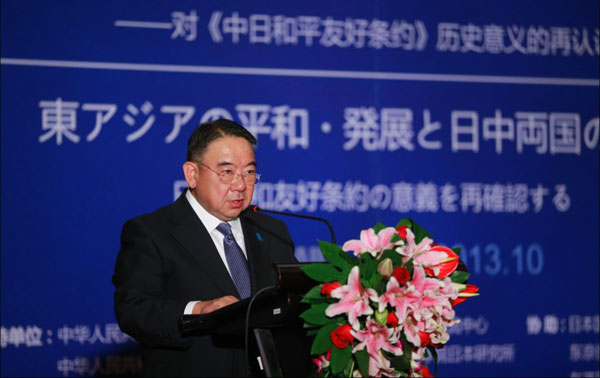Taking the sting out of ties
By Yang Bojiang (China Daily) Updated: 2013-11-05 07:23Japan should adjust its policy on disputed islands and start dialogue with China and the US to increase strategic trust
This year marks the 35th anniversary of the signing of the Treaty of Peace and Friendship Between China and Japan, but the bilateral relationship still faces serious difficulties.
At the annual Beijing-Tokyo Forum co-organized recently by China Daily and Japan's Genron NPO, participants from the two sides failed to reach a consensus on the two most prominent issues that sour relations between the two countries, namely the territorial dispute in the East China Sea and Japan's historical aggression. Worse, according to an opinion poll conducted by China Daily and Genron NPO in August, more than 90 percent of Chinese and Japanese people have negative feelings toward the other, a new record low.

Masato Kitera, Japanese Ambassador to China makes a speech at the ninth Beijing-Tokyo Forum in Beijing, Oct 26, 2013. [Photo by Feng Yongbin / chinadaily.com.cn]
Over the past three years, the relationship between China and Japan has become the trickiest part of the two countries' diplomacy. Mutual misunderstanding and enflamed "emotions " have undoubtedly played an important role in damaging their relationship, but these are not the root cause. There are several intertwined structural and cyclical factors that cause the frequent rifts between them, and both sides should look at the situation objectively.
From a wider perspective, it will be seen that the intensified frictions are due to the profound changes taking place in state-to-state relations in an era of globalization and informatization, and the changing balance of power in the Asia-Pacific and the world. Both countries are also undergoing a revival process and both are faced with the pressures of domestic transformation and structural adjustment.
There have been signs recently that Japanese Prime Minister Shinzo Abe is adjusting his administration's diplomacy, as he has refrained from delivering provocative remarks about historical issues and revising the pacifist constitution and instead called for dialogue with Beijing. But he is only making this adjustment because of diplomatic pressure from Washington and the need to win over international public opinion. It is a pragmatic and opportunistic adjustment, rather than an adjustment based on any deep understanding of the changing times and the strategic foundation for cooperation between Japan and China.











